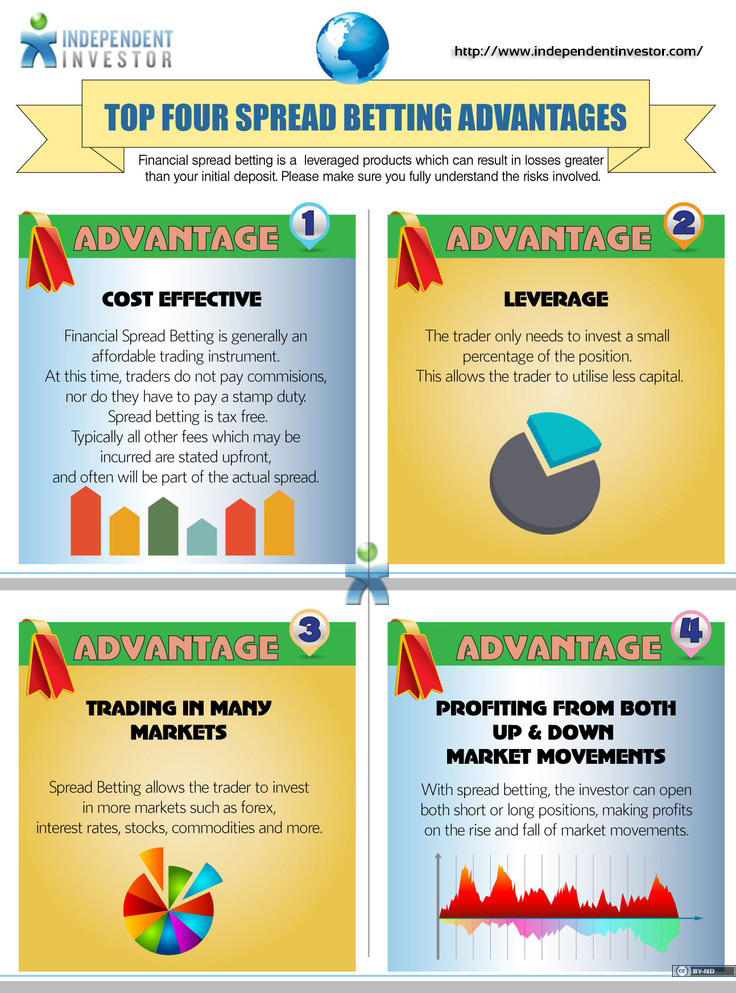Spread betting is attractive largely because it has a number of key advantages over other forms of trading. The traditional basis for comparison is trading in shares, and spread betting almost objectively presents a more attractive option for investment with lower trading costs, higher returns and a more favourable tax treatment in the UK. But even when compared to derivatives and other highly leveraged investment opportunities, the advantage of spread betting give it serious clout as a trading style, and justify its rise as one of the most popular ways to play the markets – amongst both individual and institutional investors alike.
Advantages of Spread Betting
The advantages of spread betting are multiple and diverse, and as market innovations go it’s probably one of the more clever investment product developments of the last century. We’ve taken each of the key benefits in turn to explain exactly why and how spread betting can work for you: Leverage, Tax Treatment, Simplicity, Flexibility, Range of Markets, Costs, Execution, Currency Exposure.
Advantage of Leverage
Arguable the core advantage of spread betting, transactions are highly leveraged by their very nature. A one point movement would yield insignificant proportional returns in a share or commodity market for a direct trade. With spread betting, however, one point delivers a 100% return on the initial stake, with each additional point represent another full multiple of the original stake amount. And with the possibility of broker credit, leverage can be applied to deliver substantial returns in a short period of time, lending spread betting to both individual and organisational traders as an alternative to more traditional instruments.
Tax Treatment
In addition to the built-in leverage factor, spread betting is dealt a favourable hand by the UK tax authorities. Because there is no physical transaction, spread betting is completely free of capital gains tax (which would otherwise be applicable to the trading of shares or commodities directly), and free of the stamp duty that is levied on share transactions. This can amount to a significant saving on individual transactions, and represents an even more considerable saving over time when aggregated over a number of different trades. These tax savings add up to more money in your pocket, and making grinding a profit from your trading a more achieveable goal.
Simple Transaction Structure
Unlike derivatives and other trading instruments which can give rise to particularly complex transactions and calculations, spread betting is essentially quite simple. If a market moves up by 10 points, you get 10 times your per point stake in return. If a market moves down 10 points, you lose 10 times your stake. For traders making split second investment decisions, the ease with which a spread betting transaction can be sized up makes it more amenable to quick calculations and therefore more immediate trading decisions.
Flexibility Of Financial Spread Betting
Spread betting is also an inherently flexible way of getting involved in the markets, allowing you to profit from both the upside and downside of different indices over varying periods of time. One of the main ways in which this flexibility can be put to best use is through hedging, whereby risks of other positions can be offset by taking conversely related positions in order to ideally deliver a profit in all eventualities. Because different markets can be simultaneously bought and sold, this makes it possible to more effectively manage risks while profiting from a diverse range of markets.
Wide Range Of Markets
Alongside the flexibility of the instrument itself, financial spread betting companies also offer a broad range of markets to spread bet on, including some which are inaccessible through other investment vehicles. For example, traders may be able to invest in markets for differential pairings, which work on the basis of the difference between two stock/market prices, or may be able to back interest rates or even some economic indicators. This additional scope allows traders to diversify their portfolio to a greater extent, and capitalise on a broader base of trading opportunities as a result.
Lower Barriers To Entry
Spread betting allows traders to get involved in trading multiple markets, with buy-ins starting at just £1.00 per point. This ultimately makes spread betting more accessible, and allows traders to invest according to their own budget, rather than according to the market rate and standard contract sizes. This adds to the flexibility, and allows traders to back positions based on profit potential, rather than market prices.
Instant Execution
Because spread betting doesn’t take place on an exchange, it lends itself to faster transaction execution times. This results in virtually instant execution, which has a knock on effect on profitability. With fast moving, volatile markets, every second counts, and a trade that is set to close out in profit can easily decay in the time between making the order and its actual execution on the market. With fast dealing timescales comes more responsive trading, and helps give traders peace of mind that the trading decisions they make can be best reflected in their trading bottom line.
Mitigate Currency Exposure
An advantage that perhaps doesn’t immediately spring to mind, spread betting also protects against the effects of your exposure to currency fluctuations when dealing in assets denominated in a foreign currency. Fluctuations in the currency market can eat away at your profit portions and are often subject to less than competitive exchange rates in the hands of brokers. Spread betting, on the other hand, is always denominated in your base currency and therefore provides an immunity to the risks of currency rate changes.
While these are just a few of the key benefits of trading through financial spread betting, there are many more different advantages and perks that come with the territory as a spread bettor. As a result, spread betting has adopted an almost viral nature in its spread throughout financial spheres, making it a popular choice amongst both individual traders and the large institutional investors alike.


